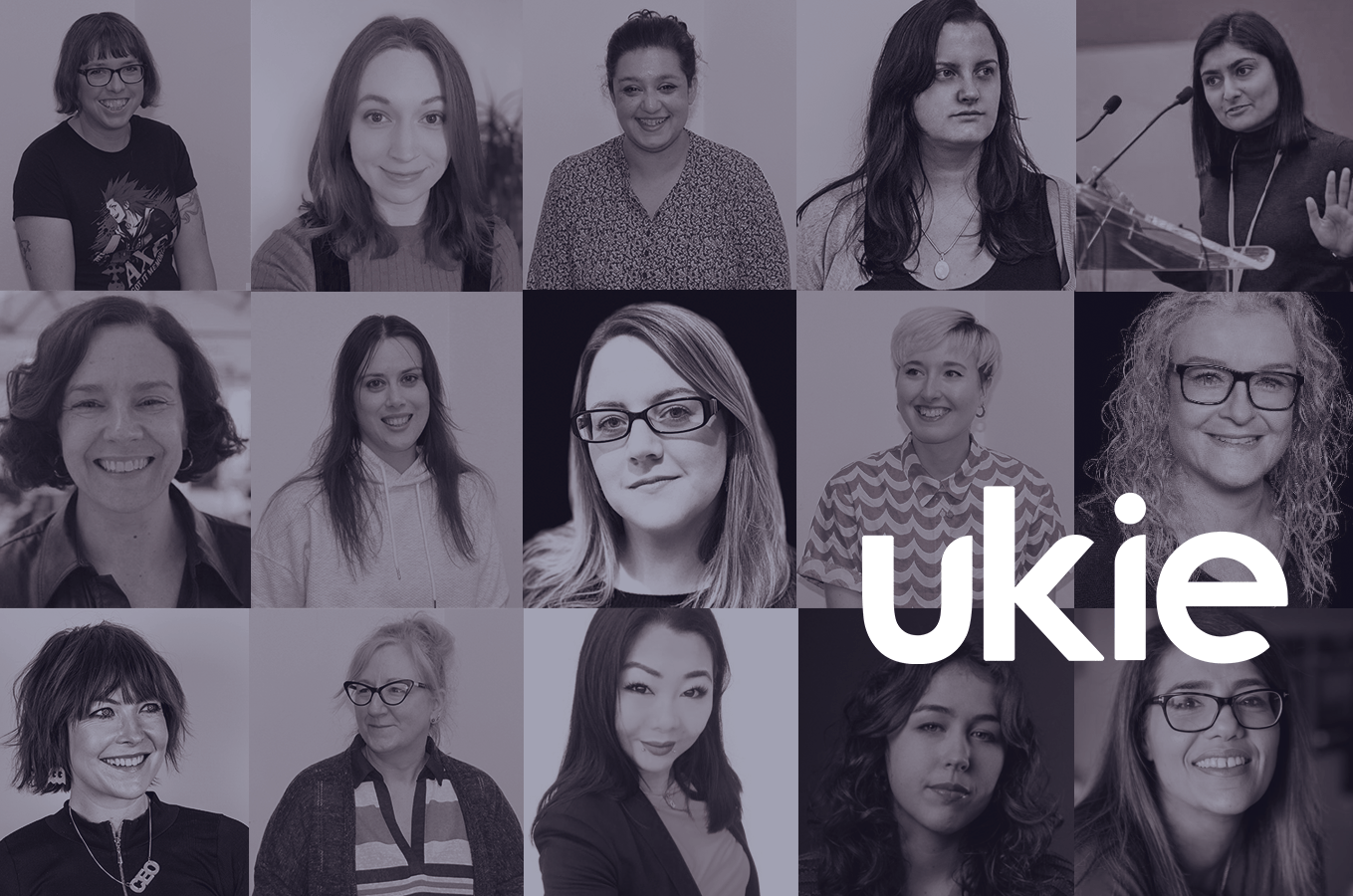To celebrate International Women's Day this 8th March, we asked the women in our team and board some questions about what video games - and the IWD theme of digital inclusion - mean to them. Check out their answers below.

Dr Jo Twist OBE, CEO of Ukie
Q1. What was your entry route to the games industry?
I spent most of my career around digital entertainment, writing about it or producing creative content around entertainment. Just before Ukie, I was commissioning games as part of Channel 4 education output.
Q2. Why is it important to have access to digital spaces like games?
Being able to play is fundamental to being human. The early days of internet message boards and chat rooms let me into a community of people from all around the world who became friends. Social virtual worlds like Second Life let me try on different identities and roam around these beautiful places people had created. Being able to connect to communities in safe ways from wherever you are is critical to learning new things and encountering different perspectives and ideas.
Q3. What was the first game you ever played (how did you enter into the world of games as a player)?
My first game was Pong because my optician told my parents to buy it when I was 5 so that I could exercise my lazy eye! Then I graduated to all the Game & Watch games. The rest is ancient history!
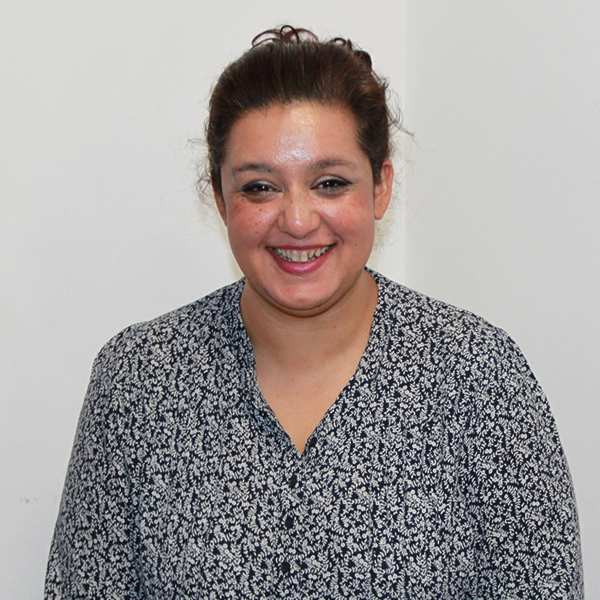
Shahneila Saeed, Head of Education and Director of Digital Schoolhouse
Q1. What was your entry route to the games industry?
I’ve always loved playing games, and the video games industry always seemed so exciting. Although, honestly I never in my wildest dreams imagined I’d be working within it; and with the people and companies that I do. Growing up my career goals switched from archaeologist, to librarian to barrister to psychologist and finally settled within teaching. I taught computing for a very long time and loved my job. What I loved most was coming up with crazy ideas to excite and engage children with computing. Finding fun non-didactic teaching methods was really my priority from day 1; and that’s what led to me to my research in play-based learning. So when the opportunity came to do that full time for Ukie; and to be able to do it on a scale to help children across the country it wasn’t one that I could turn away from. Teaching computing using play-based methods and the video games industry really do go hand in hand.
Q2. Why is it important to have access to digital spaces like games?
Part of the ethos behind Digital Schoolhouse is that students understand the relevance of what they are studying when they study computer science. We can do that by linking the concepts to real-world issues that they can relate to. That also makes it more engaging and fun, and they are more likely to be motivated to continue with it. Computing is not just for the smart kids; it is a subject that should be accessible to everyone.
- 91% of lead teachers agree that Digital Schoolhouse resources appeal equally to both genders.

Amii Oldham, Digital Schoolhouse Programme and Communications Manager
Q1. What was your entry route to the games industry?
I’ve loved playing games since I was a kid. I remember getting a PlayStation for Christmas when I was about 7 years old with a selection of random games. But the one that I was always remember as my first computer game was Croc: Legend of the Gobbos. For those who haven’t played it, Croc is a cute little 3D platformer where your role is save the Gobbos (little fluffy orange balls with eyes) and defeat the evil Baron Dante (some kind of large frog/lizard with a colourful mohawk). My brother and I were obsessed and, despite being completely overwhelmed by the idea of a ‘boss battle’, Croc started a life-long love of video games.
Q2. Why is it important to have access to digital spaces like games?
I played regularly with my siblings and my dad and was fortunate enough to make a lot of friends who enjoying playing games too. The Pokémon craze of the late 90s certainly helped level the playing field in terms of boys and girls playing, trading and battling together at my primary school and games continued to be a constant in many of my friendships through secondary school and university too. It’s only as I moved into the working world that I began to hear comments like “I’ve never met a girl who likes games before” or, more infuriatingly while dating, “You like games? Wow, you’re like a female version of me!”
Q3. What was the first game you ever played (how did you enter into the world of games as a player)?
I have spent most of my professional career working in education, first in primary schools and then moving into the charity space, but it’s during my masters in Digital Media and Education that I began to explore the impact of games and play. When my current role at Digital Schoolhouse came up, it was such a perfect combination of my interests and experience that I had to go for it! I’m so excited to be working with educators who are incorporating play-based learning into their classroom learning and continually innovating to inspire their students and colleagues alike in understanding the impact that digital skills and play can have. I’m learning so much about the games industry right now and am being exposed to new experiences all the time but I’ve been impressed by the dedication of the industry to support women and girls, tell their stories and diversify their talent pools. We still have a long way to go but it’s clear that no space should be off limits just because of your gender; games can and should be for everyone.

Dr Helen Johnson, Membership Account Officer
Q1. What was your entry route to the games industry?
During my masters, I specialised in the economic geographies of creative industries and had plans of becoming a lecturer/researcher in this field. Personally, I believed I couldn’t do this until I experienced being a creative worker myself, and so started well over a year of trying to get my foot in the door of games companies with plenty of failures along the way. I applied for a marketing internship at Ripstone Publishing, although rejected, they suggested to stay in touch. I took this as an opportunity to gain complimentary experience and go back stronger. I achieved a digital marketing qualification with Squared/Google, carried on writing my blog and grew my Etsy store – all alongside working 2 other jobs! This worked when I returned to show what I achieved and Ripstone offered me a role as social media assistant. After a year there, and an additional year as a carer, I returned to do my PhD studying the occupational community of UK game developers. Upon completion after 5 years of study, I wanted to go back into industry rather than academia – and here I now am at the start of a brand new career path.
Q2. Why is it important to have access to digital spaces like games?
Digital spaces are not something which are separate to our day-to-day lives, they weave, flow and mould around what we consider being ‘offline’. Being on Twitter or playing a game for example is often part of how we experience and understand our lived reality. By either actively excluding, or feeling like one shouldn’t be in a particular digital space provides a broader commentary on social inclusion and people’s place in society. To make people feel included, represented and respected throughout makes it easier to access hobbies for joy and opportunities to upskill, network and develop a strong foundation for the generation after us. If we succeed, don’t pull up the ladder behind you, create and maintain those access channels.
Q3. What was the first game you ever played (how did you enter into the world of games as a player)?
Probably those Tiger LCD handhelds – Jurassic Park and Lion King! The one game that hooked me in however was Tomb Raider 1996. I used to visit next door but one who had a Sega Saturn and watch him play. When he moved on to the brand new PlayStation, I was offered the old Sega Saturn and a choice of any games I wanted from the box. Thrilled, I rummaged through and found Tomb Raider – attracted because there was a woman with brown hair on the box and I too at age 7/8 was a girl with brown hair. I’ve been a Tomb Raider fan and Sega Saturn aficionado ever since.
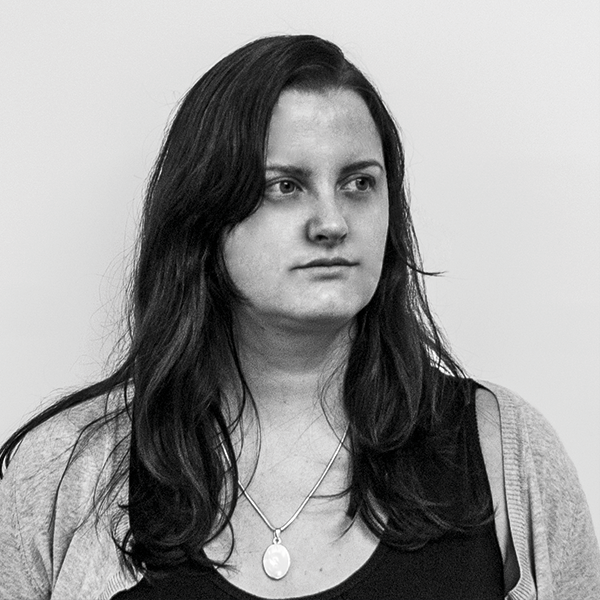
Kirstie Russell, Office Manager
Q1. What was your entry route to the games industry?
I never thought about working in the games world before joining the Ukie team, but there are no regrets here.
Q3. What was the first game you ever played (how did you enter into the world of games as a player)?
The first game I can remember playing was Super Mario Bros – still love it!
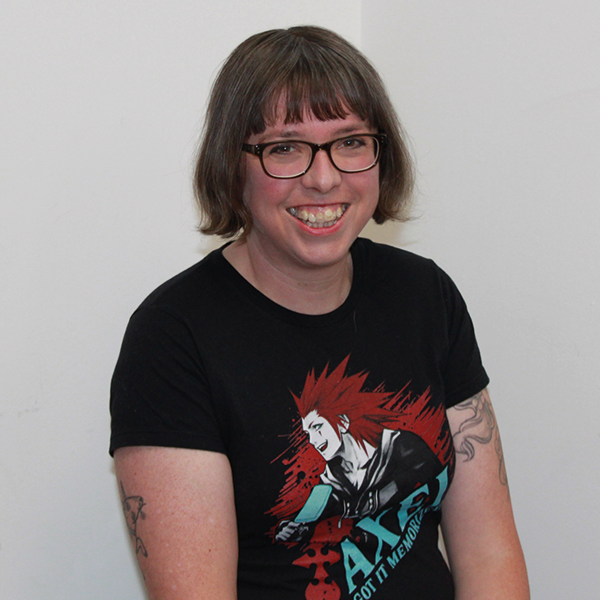
Estelle Ashman, Digital Schoolhouse Curriculum Content Developer
Q1. What was your entry route to the games industry?
My school became a lead school in Ukie’s Digital Schoolhouse programme, delivering quality computing workshops to engage the next generation in the job opportunities that that video games industry opens to them.
Q2. Why is it important to have access to digital spaces like games?
Digital spaces level the playing field, they also provide safe spaces where you can meet up with friends without leaving the house. Although these positives have been frequently touted, I don’t think the mainstream media had really understood until the Covid Pandemic meant that everyone needed to delve into digital spaces!
Q3. What was the first game you ever played (how did you enter into the world of games as a player)?
A BBC game called Granny’s Garden. We had it on the BBC micro that lived in the library at school. My Dad worked at the school I went to so he used to get to bring the computer home for the summer holidays – I could never work out what food the dragons ate!
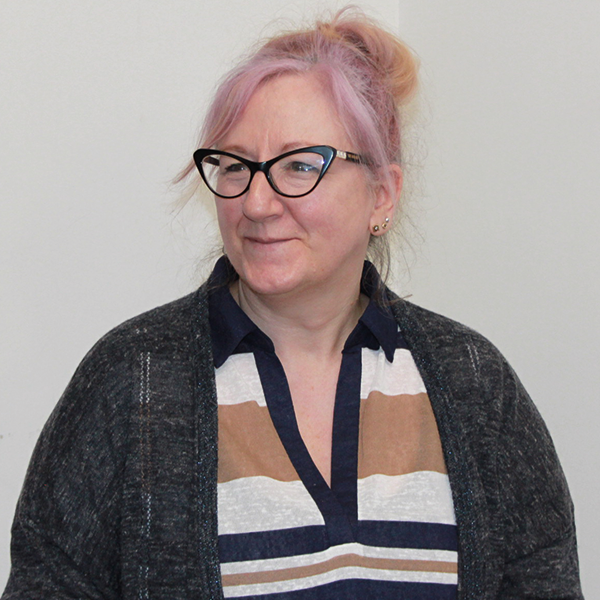
Katie Davies, Accountant
Q1. What was your entry route to the games industry?
I was looking for a more interesting role and so working for Ukie was a great opportunity.
Q2. Why is it important to have access to digital spaces like games?
Interaction with other people which can help build confidence.
Q3. What was the first game you ever played (how did you enter into the world of games as a player)?
Pong was the first game and then Electronic Space invaders hand held game.
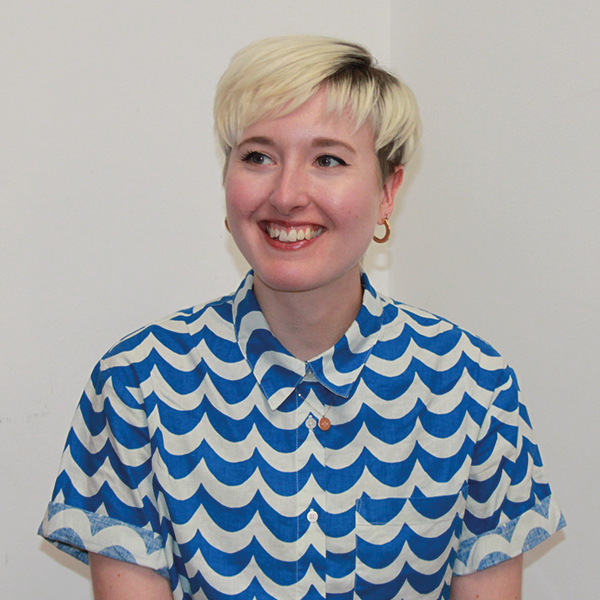
Sian Mayhall-Purvis, Educational Programme Co-ordinator
Q1. How did you start working in/what was your entry path to the games industry?
I started at Ukie 11 months ago after working in theatre for over 10 years. My last job involved working closely with schools and youth theatre groups across a range of creative and educational initiatives made possible by industry support. This introduced me to the importance of industry collaborating with education.
I’ve loved games since I was a kid, and in recent years that has become a more serious interest. At Ukie, I found an opportunity to put my experience in theatre to use in a way I’d never imagined before. I was excited to expand on the work I’d been doing in events, projects and education, but in the world of video games.
Q2. Why is it important to have access to digital spaces like games?
I think they allow for creativity, self-expression and learning that isn’t always possible or accessible in other spaces. Games can introduce you to experiences and communities that you might not otherwise have access to, and in an interactive way, which can be very powerful.
Q3. What was the first game you ever played (how did you enter into the world of games as a player)?
One day in 1997, my mum brought home a second-hand PlayStation and a copy of Crash Bandicoot. I came to both love and hate this game, and other 90s platformers, with a rage-quitting passion.
It was The Sims that truly cemented games as a life-long interest for me. I loved the humour, the muzak, the freedom to do whatever I wanted, and the licence to be playful and creative and silly. It would be my desert island game because I genuinely believe I could be infinitely entertained by it!

Louisa Keight, Communications and Content Officer
Q1. How did you start working in/what was your entry path to the games industry?
My last role was in complaints at a renewable energy company, working closely with the press team. Whilst I found I was enjoying the press side of things more and more, the consumer side of the energy industry didn’t particularly capture my imagination. During this time, the COVID-19 lockdown hit, which coincided with the release of a game in the very first franchise I ever played – Animal Crossing.
As I did when I was a child, I escaped back into the world of games. I set up a Twitter account where I tweeted jokes about my experience of the game, with the occasional viral hit and 4k followers at its peak. I branched out into games like Breath of the Wild and Stardew Valley, and I played online games with a group of loose acquaintances who quickly became a vital support network in the depths of the locked-down winter.
One of these friends of a friend happened to be George, our former Head of Communications and Campaigns. In March of 2021, George needed a "pandemic gamer" to be interviewed on Channel 5 for our annual Consumer Valuation coverage and I jumped at the opportunity. You can still find the interview if you know where to look!
Later that month I was complaining to our Discord server that I hated my job and was planning on quitting outright. George, who had been told by the crew from Channel 5 that I was a delight to work with, mentioned that Ukie were hiring - and the rest is history.
Q2. Why is it important to have access to digital spaces like games?
It is my firm belief that diversity breeds innovation. The more voices in the room, from different perspectives and backgrounds, the better the creative output. And that starts with feeling able to enter these spaces as a consumer. The more girls and people of marginalised genders we have playing games, the more likely we are to get those people working in games and making our industry even better.
Q3. What was the first game you ever played (how did you enter into the world of games as a player)?
When I was 9 years old my parents bought me a Nintendo DS and I spent the summer playing Animal Crossing with my best friend on my street to escape the bullies who had internalised the late-00s vogue for casual homophobia and mercilessly teased us, literal children, for being “lesbians.” (We both like women now. How did they know?)
In the autumn of 2006 I became dangerously ill with pneumonia, and this is when I discovered Pokémon. As a treat when I came out of hospital and was recovering at my grandparents house, I was given Pokémon Emerald. This opened me up to a wealth of new friends at school who played Pokémon like the other kids played football – I vividly remember a sunny afternoon spent with my friend Ammar where we alternated between one of us bouncing on his trampoline whilst the other attempted to catch Rayquaza on my DS. In ICT we played logic games like Zoombeenies and loved them so much we bought the CD Rom. We’d spend hours together on flash game sites like Nitrome and Miniclip – my early years at high school were marked by the kids who figured out how to download games onto the school computers and play them in the library at lunch. When I discovered Sims, this opened up yet another world, one where I could be access creative parts of my brain in ways that went beyond paper and pencil and paints.
As I got older, though, I became self-conscious. Most of the girls I was friends with didn’t play games, and the boys I was friends with were starting to branch out in to genres I found at best, uninteresting and at worst, frightening and stressful. Other than the odd afternoon trying and failing to play Portal on a friend’s console, I stopped playing games - until I bought that Switch in 2020.
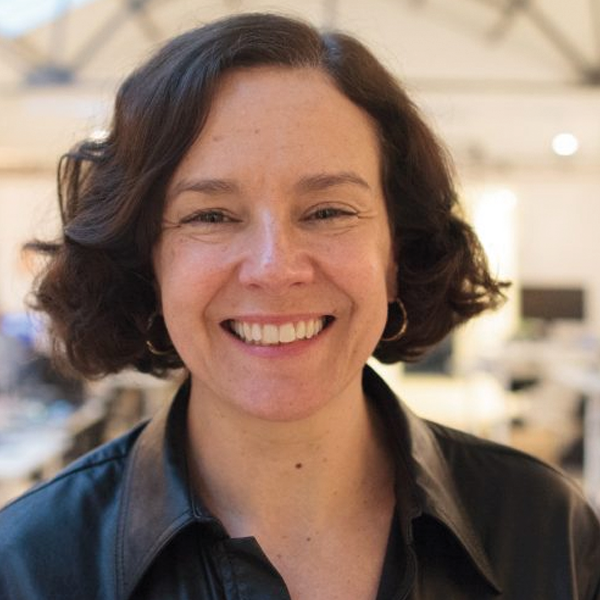
Maria Sayans, CEO at Ustwo Games, Board Member
Q1. What was your entry route to the games industry?
After a few years as a strategy consultant in media and tech, I wanted to move to a more creative role that could bring together my passion for tech and popular culture, so games seemed like a natural fit. The fact that I didn't know anyone who worked in videogames also seemed exciting to me at the time. It seemed from the outside as a space of innovation and creativity and nerdiness. I took a job with EA doing online marketing and CRM, which then led me to brand and product marketing and opened up further opportunities. I have loved working in games for over 20 years now.
Q2. Why is it important to have access to digital spaces like games?
Digital spaces play a key role today for people of all genders, backgrounds etc to develop skills, connect socially, explore their identity and imagine who and what they want to be
Q3. What was the first game you ever played (how did you enter into the world of games as a player)?
My dad had an Apple II and I used to play text adventure games on it. I found the worlds brought to life by green text on a black screen so immersive, that I had to turn the computer away from the door so I would not be startled by an ogre or some kind of monster jumping at me from it. Many years later I remember buying a gameboy to play Pokemon on the plane as a young professional, and having hours just fly by. I have always loved the way you can get lost in game worlds.

Samantha Ebelthite, Global Sales at Outright Games, Board Member
Q1. What was your entry route to the games industry?
I came into the industry 5 years ago. I was working in the fast-moving consumer goods industry. I had carved out a career in FMCG and was enjoying my experience, but a little bit of me always wanted to work on brands and products I could feel more closely connected to. When I started to look outside this industry for my next adventure, video games were an obvious choice. I loved Video Games growing up, so when I saw the opportunity to transfer my commercial skills into the diverse and growing industry of games, I jumped at the chance. I have never looked back; it’s been the best experience I could have wished for. I was at Electronic Arts for 4 and half years and more recently have joined Outright Games. Outright make games for the whole family taking amazing IP’s such as Paw Patrol, My Little Pony & DC Justice League and building fantastic games the whole family can enjoy. As a Mum of a 2-year-old and 6-year-old, I am loving playing these games with my children. And in my work, I have the joy of building the sales and distribution of these very loved games.
Q2. Why is it important to have access to digital spaces like games?
One thing I find fascinating about games is how they appeal to so many people for so many reasons. Whether It’s playing alone or connecting with family or friends online or coach coop, they play a part in so many people’s lives for so many reasons. I know many people that interact with the world of games and don’t even realise, like solving a quick puzzle on their mobile, or talking about Minecraft with their children. Why is it important? We are more aware than ever of how different we all are, and games gives everyone a chance to enjoy and connect in whatever genre and platform they enjoy most. The possibilities and the connections are endless.
Q3. What was the first game you ever played (how did you enter into the world of games as a player)?
My first console was a Super Nintendo. My older brother was always into the new games console, and as a family we started with the Atari. But I will never forget the moment I had my very own console, the SNES. I played Yoshi World and Super Mario Kart all the time. I would get my brother and his friends to help me complete the levels and unlock more for me to play. In my teenage years I was a Sims fan, building my houses and communities. I would build the biggest and best house I could. I always enjoyed a strategy game too and would spend hours on Command & Conquer building my armies and planning how to conquer the enemy. I think games are ideal for social connections, but also when you just want some time to yourself.

Jay Shin, Director at Arrogant Pixel, Board Member
Q1. What was your entry route to the games industry?
I didn't have a traditional path. I didn't go through a games design, undergrad or computer science course. I didn't make my way up through QA and a job in the games industry wasn't my lifelong dream from when I was a child. I've always been interested in games as a career and it was just part of my just part of my everyday, very much in the background my entire life. I generally teched into web development and software design, graphic design and things like that. So it was a very organic movement into the industry and just out of the desire of wanting to create cool things with my friends.
Q2. Why is it important to have access to digital spaces like games?
Personally, I found a lot of comfort in video games as a child. I didn't have a lot of friends that played video games, so it was a solitary activity for me. I think it's important to have spaces like games because sometimes the real world isn't as kind as you would like it to be. And then as a young person, it's very easy for you to absorb that negativity and make that part of your story. But why not take these amazing, incredible worlds and make them a part of your story instead, rather than dwelling too much on the negative? Because things do get better! Being a teenager or young adult is not something that I would want to repeat.
Q3. What was the first game you ever played (how did you enter into the world of games as a player)?
That's a really interesting question because I don't actually remember the first game I ever played. I think it was probably a bootleg, you know, those sort of Gameboy cartridges with about 100 games on it - Dr. Mario. And it had a pirated version of the Japanese Pokemon Green at the time. So I played that in Japanese on a pirated Nintendo Gameboy cartridge. But I think the game that I remember the most, the one that impacted me the most, is Starcraft. It's an institution in Korea. I remember going to watch matches with my family, going with my cousins to after school clubs. (I say after school club, but a PCbang where you would sit down and we'd play Starcraft for hours.) And around that time, I really got into Neverwinter nights for some reason. Then the floodgates opened and you couldn't stop me. So, yeah, I just really love playing games and making them. I wish I was a better player. I'm terrible, definitely better at developing them.

